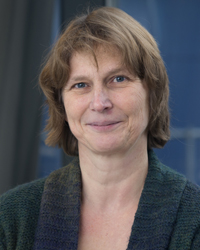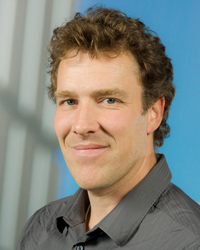
First Programme Directors’ meeting: ‘These themes are relevant to all degree programmes’
Over 40 hard-working programme directors and chairs met for the first time in the Academy Building on 27 October to exchange knowledge and experience and gain new inspiration. Rector Magnificus Hester Bijl opened the meeting with an update on strategic developments in higher education.

With general elections approaching in the Netherlands, higher education is likely to face major changes. ‘That’s why I’m so pleased we’ve come together here for the first time to talk about the developments coming our way’, said Bijl. In her presentation, she outlined the new legislation on internationalisation and the reduced requirements for the binding study advice, among other things. The programme directors then split up into groups and set to work on an interactive game facilitated by the Leiden Learning & Innovation Centre. This focused on the 13 transferable skills, which are important for all Leiden students: How do we identify these skills in the curriculum and how do we cover them in our teaching?
What did participants think of the event?

Saskia le Cessie, Programme Director of the Master’s in Statistics & Data Science
‘Although all the programme directors at the Faculty of Science meet regularly, these meetings are mainly about practical matters. So it was good for a change to talk with colleagues from other faculties about overarching themes and developments that are relevant to all programmes, such as the new legislation on international students. Issues like this play a huge role, especially with the upcoming elections, which makes it good to have received information about this directly from the Executive Board.
‘I found it interesting that the meeting focused on the 13 transferable skills, for two reasons. One, because I am working to make skills education more visible in my own master’s programme. And two, because I am currently taking the educational leadership course and we’re also thinking about how to structurally embed skills within programmes. It was useful to hear how other programmes are tackling this – and to discuss the associated challenges. Take a skill like collaboration: How do you teach students that? And perhaps more difficult: How do you test whether they’ve succeeded? In short, the meeting was both fun and informative. I’m definitely going to try to be there next time.’

Azeb Amha, Chair of the Research Master’s in African Studies
‘We don’t often meet people from outside our own faculty, so being able to exchange ideas with other programme directors in this face to face setting definitely was of added value to me. I also found Professor Bijl’s presentation very clear, particularly when it came to practical implications of the new internationalisation law, like the proposed obligatory Dutch language courses for international students. Who will provide these courses for thousands and thousands of students, when teaching staff are already scarce? As a linguist and someone from a non-Dutch speaking background, I agree that learning the language is important, but nevertheless: this needs to be organised properly.
‘After playing the serious game, our team concluded that we shouldn’t just be looking at implementing transferable skills course by course, but that we should be aiming to integrate them into the curriculum as a whole. This raises new questions: Do you implement different skills throughout the study programme, or do you introduce them all at the start and strengthen them as you go along? Looking at my own Research Master’s, the meeting made me realise that while many skills are already incorporated in our curriculum, we don’t always explicitly mention them – especially when it comes to intrapersonal skills, such as resilience and reflecting. Our lecturers will likely mention these skills more explicitly when writing their text for the e-guide. This will allow our students to use the skills as a selling point when applying for jobs or further studies.’

Michiel de Dood, Programme Director of the Bachelor’s in Physics
‘One of the reasons I felt it was important to connect with other programme directors was to see what issues affect the university as a whole. Hester Bijl’s presentation on strategic developments addressed this, especially because it clarified how the university views the new internationalisation law. We now got to see actual student numbers, rather than the often exaggerated picture painted in politics. This showed what I’d already suspected: that we in Leiden actually have a very good, future-proof mix of Dutch and international students. I also used the meeting to explore the teaching that physicists could provide in other programmes or faculties. After all, if you want to develop a minor or elective together, you first need to discuss the needs. It’s also a matter of finding logical combinations: for us, it would be easier to make the link to a programme like Public Administration than to a German one.
‘I was already familiar with the 13 transferable skills, but the serious game made it clear that it’s a real challenge to decide where they fit best in the teaching. You can’t just shove them into a programme willy-nilly; it’s a matter of careful consideration and decisions. Which skills do you incorporate in which course within a programme and how do you link them to good subject-related activities? That’s a challenge in itself.’
About the meeting
The meeting for programme directors and chairs aims to give staff who coordinate and are responsible for some or all of a programme the opportunity to discuss strategic developments in the field of education, bring central policy closer to programmes and promote knowledge exchange. The meeting is held twice a year. There is a different theme each time.
Questions?
Do you have any questions about the meeting? Please contact the Strategy and Academic Affairs Directorate via Moena al Homsi.
